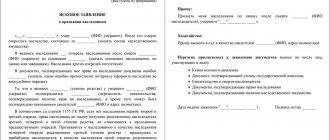Invalid wills
The law gave every citizen of Russia the right to dispose of property and personal non-property rights at his own will.
When we talk about the validity of a will, we must consider:
- the mental state of the testator himself;
- the mental health of his relatives recognized by the court as partially or completely incompetent,
- as well as the procedure for drawing up a will and other documents related to it.
If the heirs are intentionally deprived or not indicated in the order of the deceased, they have the right to judicial protection of their inheritance rights by filing an appropriate statement of claim. A will can also become invalid as a result of its recognition as void, that is, not in compliance with the law.
Types of invalid wills
In the minds of citizens, the invalidity of a will as a transaction means a complete lack of legal force. However, this is a multilateral act that entails several consequences depending on its recognition as void or voidable.
In the case of a void disposition, only evidentiary evidence of invalidity will be required. The recognition of such a transaction as void is ensured by virtue of the law, that is, by default. The court can and is even obliged to establish the illegality of a testamentary disposition when interested parties appeal about this.
The number of interested parties, according to the law, includes:
- heirs by will and law;
- their guardians and representatives;
- legatees and executors of a will.
In all other cases, the document will be contestable , since it is necessary to challenge it in court. To recognize a will as contestable, it will be necessary not only to go to court, but also to oppose the other party in the case with reference to a serious evidence base. As a result, the recognition of a closed will as invalid entails the fact that the court makes a decision on the partially or completely illegal content and effect of such a transaction.
Our judicial practice in contesting a will
An example from the practice of our legal education is the following: citizen Ch. contacted our office, he had the following situation - his grandfather died, a dear and close person in his life, and the share in the apartment, according to the will, went to citizen S. The grandfather was a WWII veteran, suffered mental dysfunction. Unfortunately, we cannot always be close to our loved ones. So in this situation, the grandson did not constantly, but only when possible, take care of his loved one. Meanwhile, citizen S., taking advantage of the situation, gained confidence and convinced the pensioner to sign a will in his favor.
Having learned about this, our client decided to restore justice, punish the enterprising citizen, and turned to us for help. We went to court and held several court hearings to challenge the will for the apartment, challenge the certificate of inheritance, and achieved what we wanted by declaring everything invalid by a court decision.
Invalidation of a will
The law distinguishes general and particular (special) grounds for invalid transactions. The first grounds determine the essence of the transaction, and the second grounds specify the decision.
Wills become invalid if a court or other body, for example, a notary, finds a violation of the law . That is, the Civil Code interprets the invalidity of a will as its essentially nullity, as well as the unlawful transfer by the testator of his property and personal non-property rights to the heirs, that is, its mootness.
Important! These two general grounds are exhaustive for law enforcement agencies to make a decision to invalidate wills.
Nullity of a will: grounds and consequences
The grounds for the nullity of an administrative act on property are both internal and external factors. For example, when it is assumed that the testator was influenced during the transaction. The conditions for the nullity of an act are united by the fact that they clearly prevent the legal predecessor from expressing his meaningful will.
Officially, a will is considered void if:
- a written order of the testator that contradicts the civil legislation on inheritance;
- lack of mandatory requirements in the document;
- incapacity of the testator.
Such facts established legally are special grounds applicable to void transactions.
The document may contain prohibited or false information, violate the interests of heirs, and encroach on public order and the moral foundations of society. In addition, if non-existent information about persons and property is found in the text of the will, the transaction must be recognized as feigned or imaginary, depending on the circumstances of the case. For example, the testator, who was considered missing, disappeared intentionally, but in fact is alive. According to the meaning of the law, the disposition of the property will come into force only after the actual death of the testator.
Mandatory requirements of the administrative act on property
When making a will, the law requires you to comply with special requirements. Thus, failure to comply with the written form and the absence of a notarial signature, the absence of witnesses, automatically gives the court the right to consider the transaction void.
The list of grounds for a void transaction should include the incapacity of a citizen. A will, as a type of unilateral transaction, must be signed only by a fully capable person. If a different state is established, the administrative act will be invalid due to its original nullity.
Insignificant will and scammers
In recent decades, cases of fraud have become more frequent when people who are prone to using drugs and alcohol are tried to be persuaded to make a will in favor of strangers. From the point of view of the law, there is no reason to consider the transaction void in terms of design and content. The status of such testators has not been legally established.
At the same time, such a will can be challenged when interested parties file claims in court. This is explained by the fact that it is possible to conduct a forensic psychiatric examination after the death of the testator.
A contested will: grounds and consequences
In the practice of inheritance cases, claims challenging the will transaction are increasingly common. The fundamental difference from a void act is that the Civil Code of the Russian Federation treats challenging a will as the only opportunity to prove with the help of a court the illegality of the transaction.
Exception! Clause 3 of Article 1131 of the Civil Code of the Russian Federation prohibits challenging a will in cases where there are minor violations of the formal procedure. For example, there is a letter error in the heir’s full name. Essentially, such clerical errors do not violate the law and do not interfere with the direct expression of the will of the testator.
Contestability of a will in case of defect of the will of the subject
A special basis for challenging the administrative act of a legal predecessor, in particular, may be incompetent, intentional, unconscious and forced execution of a document . As is the case with people leading an immoral lifestyle. This should also include the signing of a will document by minors and illiterate persons.
Persons in a state of temporary mental disorder are not able to take responsibility for their actions. This can cause wrong decisions to be made . They, like persons under psychological pressure or the threat of physical violence, are deprived of the opportunity to soberly assess the consequences of their actions and express conscious will.
How to avoid contesting a will?
The testator, expressing his will and determining the fate of his property, is free in his actions. Clients often contact our office with the question: how to avoid challenging a will? How to secure the fate of property and the transfer of rights to it to “undesirable” heirs? First of all, it is recommended to follow the optimal algorithm of actions:
- pay attention to the form and content of the document and its compliance with legal requirements;
- before visiting a notary, obtain certificates of the established form from specialized medical institutions confirming your mental state and the absence of drug and alcohol addiction;
- enlist the support of your friends to visit a notary office (they can confirm your condition and intentions in court);
- give preference to notary offices equipped with an audio and video recording system (recordings will be additional evidence of the validity of the will)
A specific tactic of legal action corresponds to a specific life situation. Before determining the fate of your property, seek advice from an experienced inheritance law attorney. Your position in court will be justified, and risks will be minimized!!!
Consequences of invalid orders of the testator
The rules of civil law do not regulate the consequences of invalidating wills. In such cases, the general rules on invalid transactions apply.
Several options are possible:
- in the presence of several testamentary acts: when the last of them is declared invalid, inheritance occurs according to a document previously drawn up by the legal predecessor;
- if there is no second administrative act: succession is carried out on the basis of law in the order of succession of heirs.
Important! The testator's order regarding property can be declared invalid only after his death.
Which persons have the right to challenge a will?
The wife or husband of the testator, as well as children, parents and relatives who belong to other queues can express disagreement (Articles 1143-1145 of the Civil Code).
The right to protest is transferred in turn. For example, if the testator has no children, the grandchildren have the right to protest. Article 1149 establishes the persons who are necessarily entitled to a share in the inheritance.
Categories of mandatory share recipients
- children who have not reached the age of eighteen or are disabled;
- disabled persons supported by the testator. These include spouses and parents.
Who can challenge a will?
The obligatory share is half of the share that the heir would receive by law.
How the testator's will is contested after death
The last will expressed by the deceased testator can be challenged. But you need to prepare to prove your position in court. To appeal, you need to know what grounds give you the right to invalidate the will.
The will is executed after the death of the testator. When there is no document on the disposal of property, real estate and other assets are distributed in order of priority.
When the will is opened, problems begin. For example, my grandmother cared for my grandmother until her death and believed that she would inherit an apartment. But the grandmother registered the apartment for her grandson.
After all, according to Article 1119 of the Civil Code, a person can dispose of his property as he pleases. In this case, the will becomes the subject of litigation between relatives.
How long does it take to challenge an inheritance document?
To challenge a document, you must declare it null and void by a notarial decision or contact a judicial authority.
The general period for appeal is three years. Three years are established for declaring a document void due to incorrect execution or establishing the incapacity of the testator.
The answer to the question of whether it is possible to challenge a will is given in this video:
One year is given to appeal on the grounds of voidability. To appeal, you must prove that the document was drawn up under threats or violent means.
Important! The period begins to count from the day the heir became aware of the violation of his rights. We advise you to have time to protest the document within six months from the date of opening of the inheritance.






